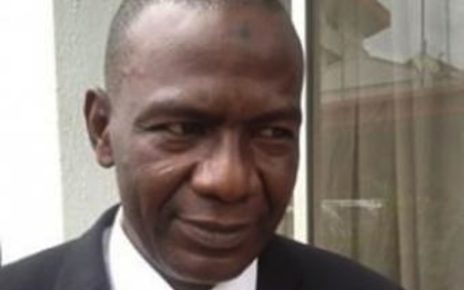The Attorney General of the Federation (AGF), Abubakar Malami (SAN), on Tuesday prayed a Federal High Court in Lagos to strike out a suit filed by leading telecom operator, MTN Nigeria Communication Ltd, challenging the N242 billion and $1.2 billion import duties and withholding tax (WHT) assessments slammed on it for payment.
Represented by a counsel, Mr T.A Gazali, at the court session, the AGF also prayed the court to decline jurisdiction in the suit, dismiss or strike out same, for being statute barred, even as he arguing his notice of preliminary objection challenging the court’s jurisdiction to entertain the case.
MTN had filed the suit by a writ, dated Sept.10, 2018, challenging the legality of the AGF’s assessment of its import duties, withholding tax and value-added tax in the sums of N242 billion and 1.2billion dollars.
The plaintiff is seeking among other reliefs, a declaration that the AGF’s demand of the sums of N242 billion and 1.2 billion dollars from MTN, is premised on a process which is malicious, unreasonable and made on an incorrect legal basis.
At the last adjourned date on Feb.7, the court had fixed March 26 (today) for hearing of the preliminary objection by the AGF, after parties informed the court of service of their various processes.
When the case was called today, Chief Wole Olanipekun (SAN), appeared for MTN, leading other senior lawyers, while Barr. Gazali, a Chief State Counsel from the Federal Ministry of Justice and his team of lawyers, appeared for the AGF.
Gazali, while adopting his notice of preliminary objection, told the court that the motion dated Nov.5, 2018 and filed on Nov.7, 2018, was brought pursuant to the provisions of sections 28 of the Public Officers Protection Act, adding that his motion was supported by a written address of the same date, and he adopted motion in urging the court to decline jurisdiction in the suit as he claimed it was statute barred.
He said that consequent upon the plaintiff’s response to the objection, he had also filed a reply on points of law dated March 22 and filed March 25, clarifying further that “the action of the plaintiff arose, following a letter written by the A-G to MTN, asking them to pay taxes which in my opinion, they evaded.”
Gazali argued that the plaintiff instituted the suit more than three months after the said letter was served thereby rendering the suit statute barred.
In addition, the senior state counsel argued that it remained the prerogative of the A-G to seek payment in cases where the government is “short-changed”, pointing out that the question whether the Public officer acted within the scope of his office, can only be determined if the suit is filed within three months.
Gazali said that once there was such failure to file within the stipulated time, then the suit is of no significance and therefore urged the court to decline jurisdiction, strike or dismiss the suit as it may please.
Responding, Olanipekun adopted plaintiff’s written address in response to the defendant’s notice of preliminary objection, arguing that the defendant by his application is not arguing that the action is statute barred but simply justifying its action, claiming that certain paragraphs of its application are misleading.
The SAN argued that the Public Officers Protection Act only protected officers acting within the ambit of the law and that it is the plaintiff’s case that vests the court with jurisdiction.
The MTN counsel drew a distinction between two letters written by the A-G in May and August, pointing out that in the May letter, the demanded sum was stated as N114 billion and $854 million but that in a subsequent letter of August, the sum was now stated as N242 billion and $1.2 billion.
Olnipekun argued that following the defendant’s notice to plaintiff of its intention to initiate processing against it, the plaintiff consequently, filed an action in court, pointing out that the matter is live action, it is extant, it is continuous.
He maintained that the defendant’s letter of August superceded that of May and had not abated or been withdrawn, urging the court to dismiss the defendant’s notice of preliminary objection.
After hearing respective submissions of the two counsels, Justice Chukwujekwu Aneke, reserved ruling on the preliminary objection until May 7.
In its writ of summons, MTN is seeking declaratory reliefs on the following grounds: that the purported “Revenue assets investigation” allegedly carried out by the Federal Government on MTN, for the period of 2007 to 2017, and its decision conveyed through the office of the AGF by a letter dated Aug. 20, violates the provisions of section 36 of the constitution; and a Declaration that the AGF acted in excess of its powers, by purporting to direct through its letter of May 10, a “self-assessment exercise” which usurps the powers of the Nigerian Customs Service to demand payment of import duties on the importation of physical goods
Others are, a Declaration that the AGF acted illegally, by usurping the powers of the Federal Inland Revenue Service, to audit and demand remittance of withholding tax and value-added tax and a Declaration that the purported “self-assessment” exercise instituted by the AGF via its letter of May 10, is unknown to the law, null and void and of no effect whatsoever.
Also, the plaintiff wants a court order, vacating the AGF’s demand letter dated Aug. 20, for the sums of N242 billion and 1.2 billion dollars from MTN Nigeria Communications Ltd. Similarly, MTN is claiming a total sum of N3 billion in damages, against the defendant, which covers General damages, exemplary damages, and Legal costs.
In his preliminary objection, the AGF argued that the plaintiff in seeking redress to the subject matter, has just three months from the date of the cause of action arose, to institute the action.
Malami also argued that the plaintiff commenced the suit in clear disregard to section 2 of the Public Officers Protection Act, which provides that any action commenced against a public officer, must be made within three months from the commencement of a cause of action.
Similarly, he argued further that the plaintiff’s failure to commence the suit within three months as stipulated by law incapacitated the court of jurisdiction to entertain same.




